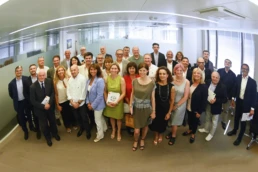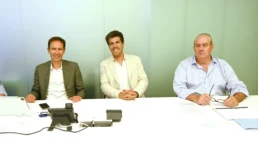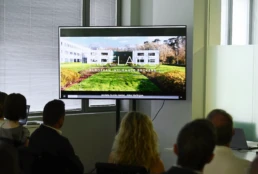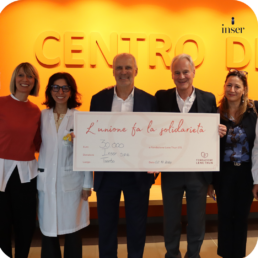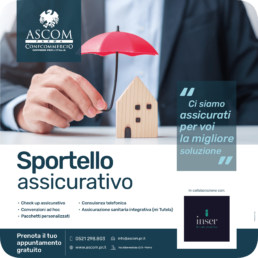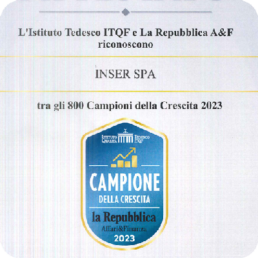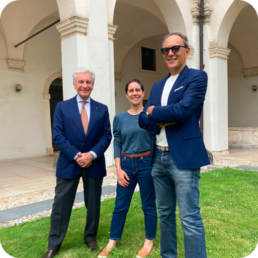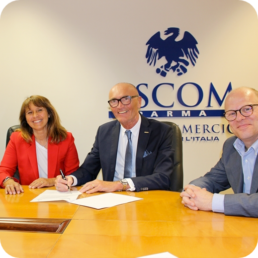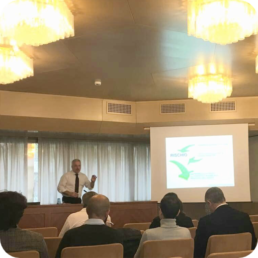Better Future 28: growth strategy and objectives 2024-2028
Better Future 28: growth strategy and objectives 2024-2028
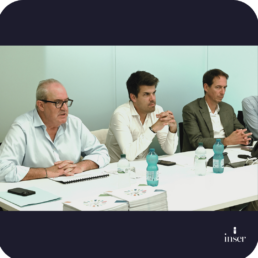
Verlingue prepares to strengthen its position in the Italian and international market by focusing on innovation, sustainability and human resources development
Verlingue, an independent, family-owned company that acquired Inser in 2024, recently launched its four-year Better Future 28 plan with the aim of strengthening its position in the international and Italian market. By 2028, the company aims to achieve a turnover of 450 million euros, focusing on innovation, sustainability and human resources development. In order to realise this project, Benjamin Verlingue, the new President and CEO of the Adelaïde Group, presented the strategic plan to the entire staff of Inser, at a meeting held in Brescia together with Anne-Jacques De Dinechin, Verlingue's General Manager, and Pierpaolo Ruggeri, CEO of Inser Spa.
Better Future 28: the goals
- expansion into new states and territories;
- increase in customers and activities;
- investment in IT and digital platforms.
The pillars of the Better Future 28 programme in Italy
- development of new insurance products;
- advanced use of digital platforms;
- annual follow-up of risks through detailed reports;
- opening of new offices to ensure proximity and personalised assistance.
In addition, it will work with new companies and reinsurers to optimally place risks. To realise this ambitious programme, Verlingue relies on the commitment of every employee.
- professional growth through the Inser Academy and the Train the Trainers programme;
- work/life balance and fair remuneration;
- a quality working environment and continuous social dialogue.
Verlingue's strategy in Italy also includes a strong focus on innovation and operational efficiency to maintain financial strength and independence. The objectives include:
- increase margins and effectively manage liquidity and dividends;
- promote an innovation-oriented entrepreneurial culture.
Verlingue is committed to developing the ESG (Environmental, Social, and Governance) path, obtaining specific certifications and promoting solidarity projects in support of local communities.
With clear objectives and concrete actions, the company is preparing to consolidate its position in the market, achieving ambitious goals by 2028.
News
Benjamin Verlingue, new Chairman and Chief Executive Officer of the Adelaïde Group, unveils the new Better Future 28 strategic plan and aims to become Europe's leading family brokerage company
Benjamin Verlingue, new Chairman and Chief Executive Officer of the Adelaïde Group, unveils the new Better Future 28 strategic plan and aims to become Europe's leading family brokerage company

The Adelaïde Group, a key European player in insurance brokerage, announces the appointment of Benjamin Verlingue as Chairman and Chief Executive Officer with effect from today. This appointment is coupled with a new strategic plan, Better Future 28, which aims to consolidate the Group's position by doubling sales by 2028, while preserving its independent, family-owned identity.
Benjamin Verlingue, previously Deputy CEO, takes over from Jacques Verlingue, who will become Chairman of the Group Strategy Committee. He will be supported by Gilles Bénéplanc and Audrey Verlingue, both Deputy CEOs. Following a carefully planned transition, the helm of the Group has now been handed over to the fourth generation of the founding family, demonstrating the continuity and family commitment that have always underpinned Adelaïde's strategy.
New governance and a new strategic plan for 2028
This latest step in an entrepreneurial saga marked by nine decades of growth comes at a time of rapid expansion, with the Group tripling its sales over the last ten years. “I am extremely proud to hand over the helm to Benjamin, accompanied by his sister Audrey, whose experience and vision are major assets for the future of the Group. In his previous roles, Benjamin proved his leadership and strategic vision. I am confident in his knowledge of the business, in his ambition and his determination to uphold our business model to ensure our continued development in a constantly changing environment,” says Jacques Verlingue, former Chairman of the Adelaïde Group.
“I am very proud and enthusiastic to be taking on this new role. Under Jacques Verlingue's leadership, Adelaïde has become a major European brokerage player and has seen its turnover grow substantially. At a time when risk management is a growing challenge, I am going to devote my energy to continuing to grow the Group by contributing to a better future for all our stakeholders, while preserving the Group's independence over the long term,” adds Benjamin Verlingue, the new Chairman and CEO of the Adelaïde Group
The Better Future 28 plan is part of this drive and reveals a clear ambition: to double the Group's turnover by 2028 to €800m. Adelaïde intends to establish itself as the leading family brokerage company on the European market, where it is already active in France, the United Kingdom, Switzerland, Italy and Portugal, to advise and support its clients as a trusted partner over the long term.
The Better Future 28 strategic plan is structured around four main areas:
• Organic and external growth: the Group's growth is based on the long-term trust placed in us by our clients. This sustained organic growth will be accompanied by continued acquisitions, with development in new countries, new areas of expertise and new market segments. The Group has developed an ability to unite talented entrepreneurs around an industrial vision, keen to further accelerate their growth and innovation trajectories.
• Developing human capital: the forthcoming Adelaïde University aims to further enhance the Group's ability to develop its employees through a multi-year training plan, the digitalisation of programmes and the development of skills certification. Modernising the way we work and improving the quality of life at work are also priorities.
• Technological innovation: as the base of the Group's independence and its ability to provide clients with high added value, the Better Future 28 plan aims to ensure the continued upgrading of the main information system, to accelerate the use of data and artificial intelligence, to develop workstations through the creation of a digital workplace and to continue to improve cyber security.
• A positive impact: we will be stepping up our actions in local areas with the aim of leaving a positive footprint. We want to help our clients to grow and prosper, by supporting them through the expected social, societal and environmental transitions. Our ESG approach, integrated into our business model, reflects this enthusiastic desire to “do our bit”. As part of this, we aim to develop balanced, long-term relationships with insurers and other risk carriers in order to offer our clients the best possible cover solutions.
Leading companies in their core markets
With a team of more than 2,500 employees, the Adelaïde Group has set itself the target of recruiting more than 250 new talents in 2024. The Group will continue to promote training, integration and development policies to foster the career development of its employees.
The plan also unveils a firm commitment to operational excellence for each subsidiary:
• Verlingue, which specialises in corporate insurance brokerage, is aiming for a new stage in its growth, with an aggregate turnover target of €450 million in 2028 and the employment of 400 new employees in France and Europe.
• Génération aims to reinforce its status as the benchmark Third-Party Administrator
• (TPA) in social protection, with a target of 3.5 million policyholders with health insurance cover and 1.5 million with personal protection cover by 2028.
• Cocoon, which specialises in individual insurance, aims to double in size by 2028 by offering tailored insurance solutions for families and their households based on ethical and responsible practices.
A commitment to financial and non-financial performance
The Better Future 28 plan also focuses on non-financial performance, integrating environmental, social and governance (ESG) issues at all levels of the company. A growing company since its foundation, the Adelaïde Group has set itself 9 clear performance indicators for 2028 that illustrate its commitmentto pursuing sustainable and balanced growth while strengthening its role as a trusted partner for all stakeholders in facing the transitions ahead:
• Turnover of €800m
• 6 million policyholders
• Volume of premiums brokered: €6bn
• 100% of employees trained in major transitions and ESG issues
• 15% of employees certified at Adelaïde University
• 2-fold increase in the number of mobility schemes
• 98% client retention rate
• 95% customer satisfaction
• 50/50: Gender balance among managers
About the Adelaïde Group
The Adelaïde Group specialises in insurance consultancy, intermediation, distribution and management. It is geared towards enabling its customers to run their businesses through effective risk management, by helping them protect their operations and their employees. For over 90 years, the Group has been tirelessly innovating, growing and reinventing itself to become one of the main players in insurance brokerage in France, with three thriving companies: Verlingue, Génération and Cocoon. Organic and external growth, the development of human capital, technological innovation and positive impact are the four priorities the Group has set itself to achieve its goal of becoming Europe's leading family-owned insurance broker.
2,500 employees | €3,000bn in premiums brokered |2.4 million policyholders with health insurance cover and 1.1 million with life insurance cover | 5 locations in Europe: France, Great Britain, Switzerland, Portugal, Italy | www.adelaidegroup.fr
News
Does the purchase of a house in common with the RUP's son constitute a conflict of interest situation?
Does the purchase of a house in common with the RUP's son constitute a conflict of interest situation?

In this article, the Lecce Regional Administrative Court (TAR) examines cases of conflict of interest that may affect the legitimacy of administrative action.
The case.
The Apulia Lecce Regional Administrative Court, in judgment No. 1250 of November 9, 2023, dealt with the appeal of an exclusion order from a tender procedure, whose sole ground of appeal related to the conflict of interest allegedly faced by the RUP.
In this regard, the alleged conflict of interest was allegedly manifested by the circumstance that the sole director of the appellant company, together with his wife, had purchased a property in common with the RUP's son, who moreover had paid his share with money received as a donation from his father.
The decision.
However, the ruling nevertheless considered the merits of the dispute, with regard to the hypothetical vitiating effect that the existence of the feared conflict of interest situation would have had, had it been proven.
In the opinion of the judges, the conflict of interest could not have vitiated the tender notice in any case, as “at the time of the adoption of the lex specialis the public official cannot be in any condition of conflict of interest with reference to the hypothesis of habitual frequentation, for the obvious reason that the target audience of the act is still undetermined.”
Although the decision under consideration was decided in the regulatory regime prior to the effectiveness of the new Public Contracts Code, this guideline should be considered valid under the current regime as well.
First, because relationships of habitual frequentation certainly well can be considered a cause of conflict of interest, by virtue of the provision of Article 7, Presidential Decree 62/2013, which, although not covered by Article 16, still constitutes a parameter for determining cases.
Second, as for the evidentiary profile, the express provision contained in Article 16 of the new code (which places the burden of proof of the conflict of interest on the person who raised it) would confirm even under the new code regime the reasons expressed by the judgment under review, referring to the lack of sufficient evidence of the existence of the conflict of interest situation.
For further discussion:
- Art. 7, Presidential Decree 62/2013.
News
Right of recourse: prerequisite and burden of proof
Right of recourse: prerequisite and burden of proof

A recent ruling by the Supreme Court of Cassation reminds us of some unfailing concepts governing the RCA
The case.
On 9.09.2007, two motorcyclists collided head-on and both lost their lives.
In 2010, the relatives of one of the two drivers sued, as co-obligor, the co-owner of the motorcycle driven by the other driver, as well as the insurance company.
Appearing in court in a timely manner, the insurance company argued that at the time of the accident the driver was not qualified to drive the vehicle, as he held only a “B” license, but not also an “A” license, which is required to drive motorcycles. For these reasons, he concluded for the rejection of the plaintiff's claim, by virtue of the clause in the liability insurance contract, insofar as it excluded coverage in the event of an accident caused by a driver who was not qualified to drive.
The Supreme Court of Cassation, in ruling No. 4756 of Feb. 22, 2024, addressed the issue, identifying the scope, content and prerequisite of the right of recourse.
Decision.
All of the above persons fall into the category of “insured,” on the sole condition that they have driven the vehicle with the consent of the owner. As a result, all of them will be eligible for insurance coverage in the event of a claim, and all of them will be exposed to recourse action if the conditions are met.
However, the courts of legitimacy clarify that the prerequisite for this right can be found in the contract: that is, the holder of the right of recourse can act only if there is a risk delimitation clause. And if a risk delimitation clause were missing in the insurance contract, recourse cannot be exercised, because the prerequisite would be lacking.
Therefore, the basis of this right is a contractual covenant, the action of which is contractual in nature, and, like all judgments arising from the contract, the liability insurer has the burden of proving that the contract contains a risk delimitation clause, such that in the specific case it can refuse or reduce payment.
For further study:
- Article 144, second paragraph, Insurance Code.
News
The new definition of “gross negligence”: a caveat to the principle of trust
The new definition of “gross negligence”: a caveat to the principle of trust

Inserted as a caveat to the general principle of Trust, it becomes the basis for the imputation of fiscal responsibility. So, it is important to know when there is (or is not) gross negligence.
If in order to arrive at a result it is necessary to “trust” the administration and its choices, however, within the scope of the activity (or non-activity) performed, the public official may incur the new administrative liability for gross negligence.
According to Article 2, Paragraph 3, there is gross negligence, in cases of violation of rules of law and administrative self constraints, as well as in the circumstances of blatant violation of the rules of prudence, expertise and diligence.
Thus, the new Procurement Code introduces two hypotheses of gross negligence: the specific one, which requires the violation of (i) rules of law and self-binding (think, for example, the failure to comply with the clauses of the tender notice); or the generic one, which can be traced back to (ii) blatant violation of the rules of prudence, expertise and diligence.
On the other hand, serious misconduct does not occur, even though the employee has engaged in the above-mentioned violations, where the violation or omission was determined by reference to prevailing case law or opinions of competent authorities. And given the literal tenor of the provision, scriminations will certainly operate in cases of pronouncements of the Council of State, or opinions issued, for example, by ANAC, AGCOM, the State Bar and the Council of State itself, in an advisory capacity.
However, the new gross negligence regime is temporarily limited: Article 21(2) of Law No. 76/2020 exempted liability for gross negligence for commissive acts only.
More precisely, in order to avoid a total paralysis of procurement (given that the past problems related to “defensive bureaucracy” were compounded by the emergency situation of the COVID pandemic), in 2020, the legislature decided to exempt the public employee from only commissive negligent acts. This regime, initially scheduled to last until June 30, 2023, was extended to December 31, 2024.
Therefore, as of today, liability for gross negligence covers only omissive conduct. Upon expiration, the legislature may decide to extend, or reinstate the ordinary liability regime.
For further discussion:
- Law No. 76/2020, Article 21, Paragraph 2.
News
Integrating public health care with mutual aid societies and funds: discover the most effective solutions
Integrating public health care with mutual aid societies and funds: discover the most effective solutions

Inser S.p.A. guides you in choosing among health funds, mutual benefit societies and private insurance companies to effectively integrate public health care. Learn more
Attention to health care has grown exponentially, accelerated by the Covid-19 pandemic. According to the February Ivass report, total healthcare spending in Italy amounted to 171.9 billion euros in 2022, equivalent to 9 percent of GDP. Of this, 75.9 percent is covered by the public sector, while the rest includes private and intermediate spending, the latter managed mainly by health funds and insurance companies. It is evident how supplementary health care has become a fundamental pillar for the well-being of Italian citizens, with one in three Italians owning a health insurance policy, and 15 million of these through group policies.
Health care integration options
- Health funds represent one of the main forms of negotiated supplemental health care. They operate on a nonprofit basis and are often created through collective agreements between workers and companies. For example, Fondo Tutela offers welfare benefits to employees of member companies, with significant tax benefits.
- Mutual Aid Societies, which arose in the 1800s, offer support in cases of illness, accident or job loss. They operate on a nonprofit basis and are open to voluntary membership, promoting a culture of mutuality and prevention, as exemplified by Fund Mutua MiTutela. Founded on the principles of solidarity and mutual exchange, this Fund is offered by Inser S.p.A. to provide its clients with access to medical and welfare benefits, with the benefit of tax and contribution concessions.
- Insurance companies operate for profit and may impose selection criteria on members, such as age limits and health assessments. These offer customized policies and tailor to the specific needs of clients, unlike funds and mutual benefit societies that take a more general approach.
News
Inser Spa strengthens presence in Lombardy with the incorporation of S.Lorenzo srl
Inser Spa strengthens presence in Lombardy with the incorporation of S.Lorenzo srl

As of May 1, 2024, S. Lorenzo srl has become part of INSER Spa, find out the details of this transaction and its implications for the Lombardy market
As of May 1, 2024, S. Lorenzo srl is part of Inser Spa. This operation marks an important step in the company's growth strategy in Lombardy. In fact, it not only marks the transfer of financial control-completed after the acquisition of share capital in June 2019-but also reflects our ongoing commitment to expanding and improving the services we offer.
This incorporation is the conclusion of a project and strategic vision aimed at integrating professionalism and expertise, and ensuring the continuity and excellence of services that our clients expect from us.
This move also significantly increases our competitiveness in the territory and, similar to what has happened with other acquisitions, confirms our desire to maintain and strengthen relationships with our clients and the local market. Through this expansion, INSER Spa once again demonstrates its commitment to providing superior service that is appreciated and recognized throughout the country.
News
The advantages of insurance brokerage (from "Gusto - Cibus Special")
The advantages of insurance brokerage (from "Gusto - Cibus Special")
Inser is one of the leading independent players in the Italian insurance brokerage market. It has consolidated its position by becoming a solid point of reference thanks to its proven ability and expertise in providing suitable solutions for corporate risk management and in-depth knowledge of the markets and sectors in which companies and public administrations move on a daily basis
Read here the article published in "Gusto" Cibus special edition. The magazine was distributed during Cibus the international trade fair dedicated to Food.
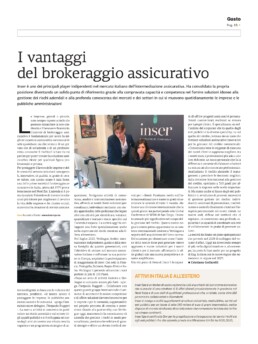
News
Global risk challenges: Inser's international team at WBN's 70th Global Conference
Global risk challenges: Inser's international team at WBN's 70th Global Conference

Inser, with its international team represented by David Lee Rodriguez, will attend WBN's 70th Global Conference in San Diego in partnership with Verlingue for the first time since its acquisition last year.
WBN's Global Conference in San Diego is the most significant annual event in the field of risk management, a unique time to reflect on crucial topics such as the reinsurance market, cyber risks, artificial intelligence, stress testing, and workers' compensation. A unique opportunity to:
- interact with risk professionals from various industries for a comprehensive view of risk management;
- collaborate with international leaders and experts to exchange ideas and strategies against emerging risks;
- delve into new methodologies.
A promising future for Inser and Verlingue
Keep following us for more information about participating in this event.
News
The Adelaïde Group announces 18% growth in turnover in 2023
The Adelaïde Group announces 18% growth in turnover in 2023

This morning, Jacques Verlingue, Chairman, Gilles Bénéplanc, Managing Director, and Benjamin Verlingue, Deputy Managing Director, presented the Group's results and highlights for the year just ended.
In 2023, the Adelaïde Group's growth accelerates and its performance exceeds its objectives
In 2023, the Adelaïde Group will achieve a total turnover of 400 million euros, an increase of 18% compared to 2022. These results exceed the targets set and the Group's strategic ambition to achieve a turnover of more than 400 million euros by the end of the IMPACT24 plan.
Thanks to new acquisitions in Europe, the Group is continuing its internationalisation policy, with 25% of its business generated outside France. Over the last 4 years, the Group has made 9 acquisitions or participations (*).
At the same time, the Group is stepping up its innovation and digitalisation efforts by launching distinctive new services for its customers, particularly in the property sector with Goodloc, as well as new customer extranets and a new mobile application for Génération.
In 2023, customers once again confirmed their relationship of trust with the Group's teams, both in terms of customer experience and continuous improvement in service quality, expressing full satisfaction in the Net Promoter Score (NPS) survey.
"In a fast-moving industry, our positioning as an independent broker allows us to thrive while ensuring very sustainable growth and reconciling a personalised and profitable approach. We are proud of these results, which testify to the unwavering commitment of our teams and the solidity and efficiency of our Group, which will celebrate its 90th anniversary in 2023," said Jacques Verlingue, Chairman of the Adelaide Group.
Verlingue, the subsidiary specialising in corporate protection, which has been managed by Anne-Jacques de Dinechin since mid-2023, recorded total revenue of €285 million in 2023, an increase of 19%, of which 50% was organic growth. Verlingue's activities outside France account for 35% of this total, thanks to an external growth strategy that has seen the creation of new offices in Europe, notably in Italy with the acquisition of a majority stake in the Italian broker Inser, and in the UK.
Over the last 4 years, Verlingue has made 4 acquisitions outside France - in Portugal (2020 and 2022), Italy (2023) and the UK (2023) - and 2 acquisitions in France - Cabinet Depeyre and Depeyre Solutions (2023).
Génération, which specialises in the management of health and social care contracts, is consolidating its growth with an increase of 18% compared with 2022, reaching a turnover of €102 million in 2023. This growth will be accompanied by an expansion of the client base, with more than 2.4 million beneficiaries in the health sector and 1.1 million in the pension sector, for a total of €1.6 billion in benefits paid out. In addition, the personal lines business is showing promising growth with more than 150,000 members. At the same time, Génération is continuing its territorial expansion with the opening of a new office in Saint-Nazaire, consolidating its multi-site strategy.
In 2023, Cocoon, which specialises in the distribution of health and pension insurance to individuals, strengthened its management team with the arrival of Fanny Ridet as General Manager. With a turnover of 13 million euros, Cocoon aims to become a recognised player in the digital and ethical distribution of integrated healthcare solutions.
"In this 2024, we are pleased to maintain the dynamic development of the Adelaide Group and to exceed the objectives of our ambitious strategic plan. Our results continue to grow steadily, fully demonstrating our commitment to delivering ever greater value to our customers," said Gilles Bénéplanc, Chief Executive Officer of the Adelaïde Group.
Adelaïde confirms its ambition to become a leading broker in Europe thanks to its independent and family-run model
One year after the official conclusion of the Impact 24 strategic plan, the Adelaïde Group's growth is dynamic and in line with its objectives, and its financial performance is also on target.
With an increase in the percentage of Verlingue's turnover generated internationally, the Group is firmly committed to European expansion.
"Our performance demonstrates our commitment to the European strategy. As an independent, family-owned company, we want to preserve this identity while expanding our activities in France and abroad. These results confirm our ability to offer an alternative to large global or financial brokers," says Benjamin Verlingue, Deputy CEO of the Adelaïde Group.
A future change of leadership in the name of innovation and growth
In 2024, there will be a major change in the Group's leadership when Benjamin Verlingue takes over from Jacques Verlingue as Chairman. This transition is part of continuity and reflects a firm commitment to preserving the Group's independence and innovative spirit. As the baton is passed from one generation to the next, the Adelaïde Group can count on a solid foundation and an established strategic position.
With a team of more than 2,500 employees, Adelaïde aims to recruit more than 250 new talents in 2024, in addition to the 300 new employees who joined the Group in 2023. The Group will continue to promote a policy of training, integration and development to support the professional development of its employees.
The Adelaïde Group
The Adelaïde Group specialises in consulting, brokerage, distribution and insurance management. Its raison d'être is to enable its clients to conduct their business through good risk control, helping them to protect their business and their employees. For more than 90 years, the Group has never stopped taking risks, growing and reinventing itself to become one of the leading insurance brokers in France, with three successful companies: Verlingue, Génération and Cocoon. Organic growth and strategic acquisitions, international expansion and digital transformation are the 4 objectives the Group has set itself to build a large, family-owned and independent insurance brokerage group on a European scale. 2,500 employees | 3,000 million euros in negotiated premiums | 2.4 million insured in the health sector and 1.1 million in the pension sector | present in 5 European countries: France, UK, Switzerland, Portugal, Italy | www.adelaidegroup.fr
(*) 5 acquisitions or participations outside France - Portugal (2020 and 2022), Italy (2023) and the United Kingdom (2023) - and 4 in France - Angelus (2022), Zenioo (2022), Cabinet Depeyre (2022) and Depeyre Solutions (2022).


